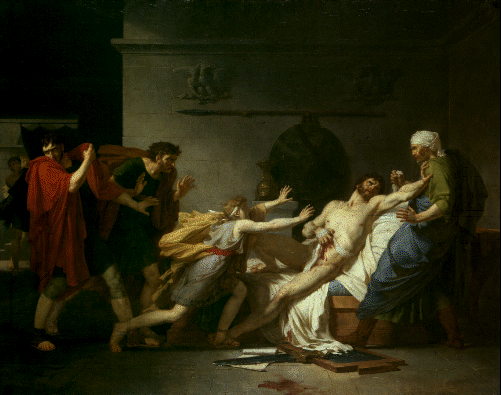Note to JULIUS CAESAR, 2.1.295, 'Cato's daughter'
Plutarch, Shakespeare's primary source, wrote of Portia: "Porcia, the Daughter of Cato, gave no place unto her father [i.e., was not at all inferior to her father] nether for chastitie, nor greatnes of mind."1
Portia's father is known as either Cato the Younger, to distinguish him from his famous great-grandfather, or as Cato of Utica, because he ended his life there. Trapped in Utica, a town on the northern coast of Africa, with Caesar's forces approaching, Cato realized that he could not mount a defense, so he arranged for the escape of his supporters and then killed himself rather than submit to Caesar's tyranny.
Here is Plutarch's description of the end of Cato's life:
[His first thrust of his sword into himself] killed him not presently, but drawing on to his latter ende, he fell downe upon his bedde, and made such a noyse with his fall (overthrowing a litle table of geometry hard by his bedde) that his servaunts hearing the noyse, gave a great shreeke for fear. Thereuppon his sonne and his friendes ranne into the chamber, and found him all of gore bloud, and the most part of his bowells comming out of his bodye, himself being yet alive, and seeing them. They were all striken with such sorow to behold it, that at the first they were so amazed, as they could not tel what to say to it. His Phisitian comming to him, he went about to put in his bowels againe which were not perished, and to sow up his wound. But Cato comming to him selfe, thrust backe the Phisitian, and tare his bowells with his owne handes, and made his wound very great, and immediatly gave up the ghost.2

Painting by Pierre-Narcisse Guerin, 1797.
1Plutarch. Plutarch's Lives of the Noble Grecians and Romans- Englished by Sir Thomas North. Trans. Sir Thomas North. Vol. 5 (1579. London: David Nutt, 1896.) 179.
2Ibid. 177-8.


